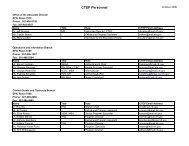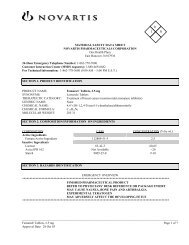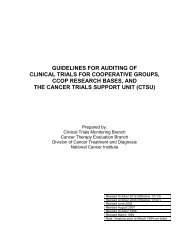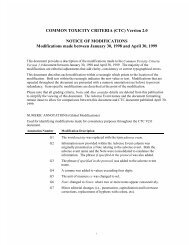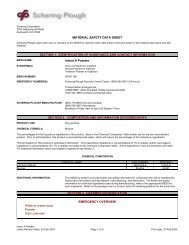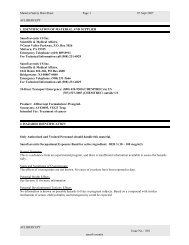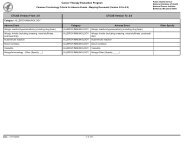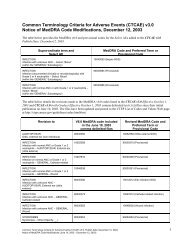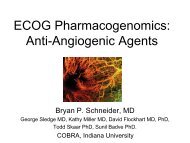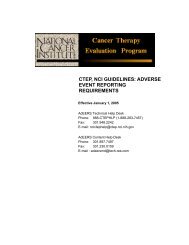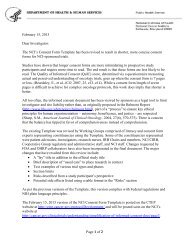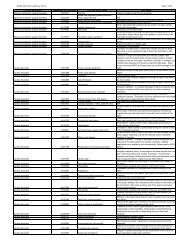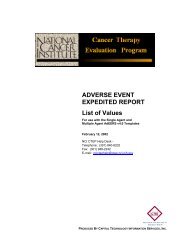NCI National Clinical Trials Network (NCTN) Program Guidelines
NCI National Clinical Trials Network (NCTN) Program Guidelines
NCI National Clinical Trials Network (NCTN) Program Guidelines
You also want an ePaper? Increase the reach of your titles
YUMPU automatically turns print PDFs into web optimized ePapers that Google loves.
PART 1: Overview of <strong>NCTN</strong> <strong>Program</strong> Section IV – Terms/Conditions of Award – <strong>Network</strong> Group Ops Centers<br />
conducted under <strong>Network</strong> Group or company INDs or IDEs with appropriate monitoring per<br />
the <strong>Network</strong> Group data and safety monitoring plan or Data and Safety Monitoring Board<br />
(Data Monitoring Committee) policy for randomized phase 2 trials.<br />
� Agents from <strong>NCI</strong>/DCTD Collaborators: All <strong>NCTN</strong> studies using <strong>NCI</strong>/DCTD-sponsored<br />
investigational agents or agents supplied by CTEP, CIP, or other DCTD programs under<br />
Collaborative Agreements (such as Cooperative Research and Development Agreements<br />
[CRADAs], <strong>Clinical</strong> Trial Agreements [CTAs], and <strong>Clinical</strong> Supply Agreements [CSAs]) must be<br />
conducted in accordance with the terms of the <strong>NCI</strong>/CTEP Intellectual Property Option to<br />
Collaborators, found on the CTEP website at:<br />
http://ctep.cancer.gov/industryCollaborations2/intellectual_property.htm, and the <strong>NCI</strong><br />
Standard Protocol Language for CRADAs and CTAs. When new avenues of cancer therapy<br />
involving any investigational agents are pursued, the clinical information obtained in the<br />
study should be acceptable to the FDA and other health authorities for inclusion in a<br />
possible licensing application. When <strong>NCI</strong>/DCTD and the <strong>Network</strong> Group contract with the<br />
same company (or companies) for support for the same trial (i.e., trials conducted under a<br />
<strong>NCI</strong>/DCTD Collaborative Agreement, the Group contracts may require review by the<br />
appropriate DCTD program at the discretion of <strong>NCI</strong> (see Part 4 – Appendices - Section I.F. in<br />
these <strong>Guidelines</strong>).<br />
� <strong>NCTN</strong> Required Tools and Services: <strong>Network</strong> Groups are required to use standard <strong>NCTN</strong><br />
tools and services for all <strong>NCTN</strong> trials including, but not limited to: (a) the Common Data<br />
Management System for study design/build and data collection with case report reports<br />
(CRFs) designed by the SDMC that are compliant with the <strong>NCTN</strong> <strong>Program</strong> approved sections<br />
of the data dictionary for common data elements in the <strong>NCI</strong> Cancer Data Standards Registry<br />
and Repository (caDSR) (see https://cabig.nci.nih.gov/community/concepts/caDSR/); (b)<br />
<strong>NCTN</strong> information system for tracking biospecimen collection from <strong>NCTN</strong> trials (in<br />
development); (c) <strong>NCTN</strong> Oncology Patient Enrollment <strong>Network</strong> (OPEN) and Regulatory<br />
Support Services (RSS) via the Cancer <strong>Trials</strong> Support Unit (CTSU) for central registration and<br />
randomization of patients onto <strong>NCTN</strong> trials; (d) the <strong>NCI</strong> Common Terminology Criteria for<br />
Adverse Events (CTCAE); (e) the Comprehensive Adverse Event and Potential Risks (CAEPR)<br />
for agents, if available; (f) the <strong>NCTN</strong> specification for appropriate designation of per case<br />
management funding for trials prior to study activation; and (g) review of all pediatric phase<br />
2 and phase 3 trials and all adult phase 3 trials and selected phase 2 trials by the appropriate<br />
<strong>NCI</strong> Central Institutional Review Boards.<br />
� Adverse Event Reporting and Patient Safety: The <strong>Network</strong> Group Operations Center must<br />
establish a system for assuring expedited reporting of all serious adverse events to ensure<br />
potential patient safety issues can be identified and addressed quickly. Adverse events<br />
should be reported using the Common Terminology Criteria for Adverse Events v4.0 (CTCAE)<br />
or most recent version, which is <strong>NCI</strong> and DCTD’s standard language for reporting adverse<br />
events in oncology clinical trials.<br />
� For agents under DCTD-sponsored INDs, this involves reporting to the appropriate DCTD<br />
program via the Adverse Event Expedited Reporting System (AdEERS), or its successor<br />
application, according to the guidelines specified in each protocol. <strong>Network</strong> Groups must<br />
also use AdEERS, or its successor application, for expedited reporting of serious adverse<br />
events for all <strong>NCTN</strong> trials (even those not under a DCTD IND or not under any IND/IDE) since<br />
AdEERS provides reporting pathways for studies that do not include DCTD IND agents, as<br />
well as pathways for studies that do not include any agents (e.g. surgical only study,<br />
radiation only study). Serious adverse event reporting for all <strong>NCTN</strong> trials should follow the<br />
“<strong>NCI</strong> <strong>Guidelines</strong> for Investigators: Adverse Event Reporting Requirements for DCTD (CTEP<br />
and CIP) and DCP INDs and IDEs” available at:<br />
http://ctep.cancer.gov/protocolDevelopment/electronic_applications/docs/aeguidelines.pdf<br />
Page 44 of 241



